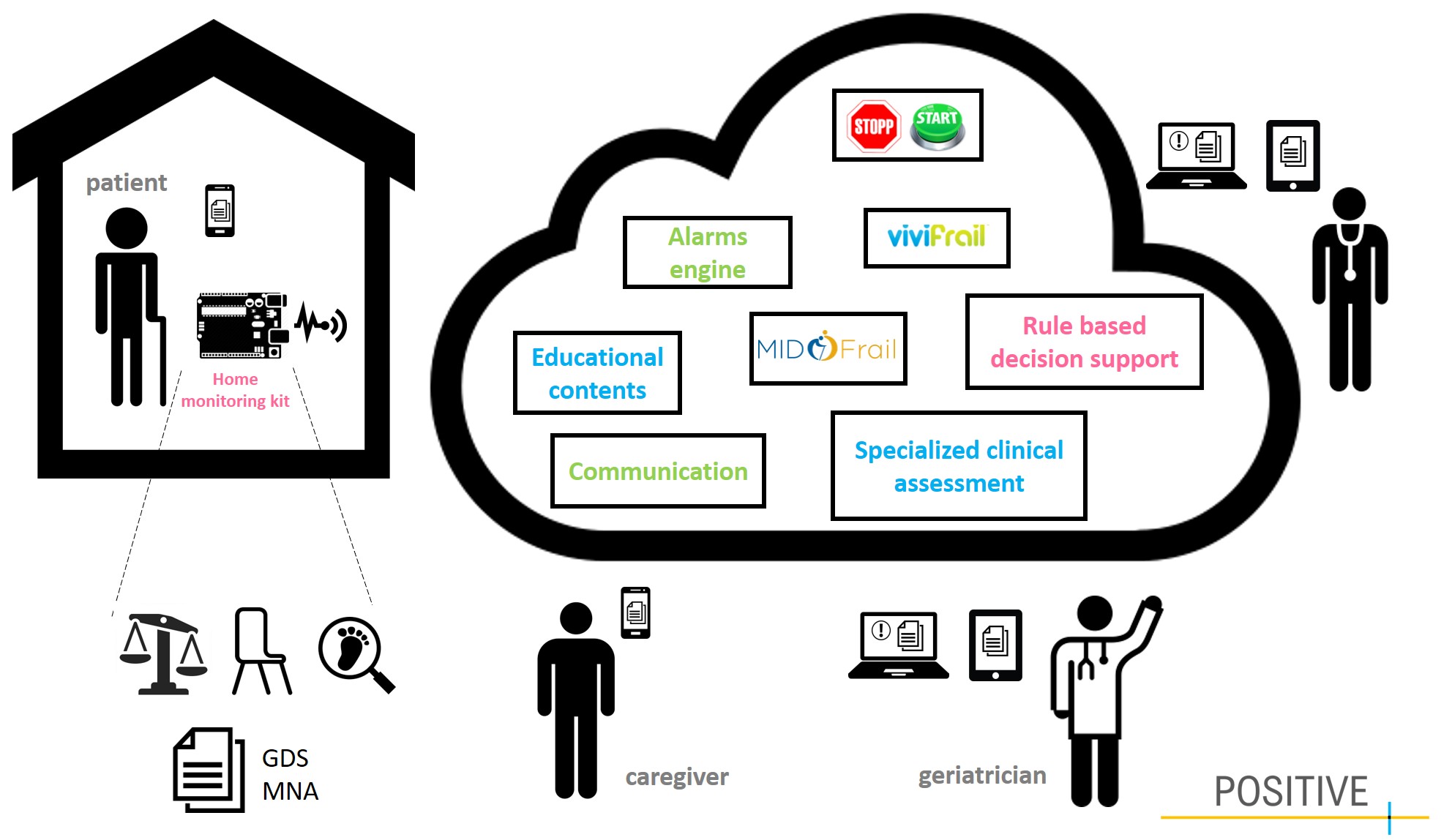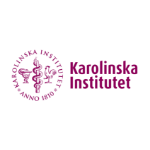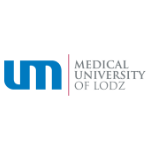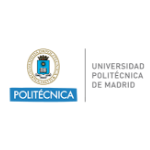Maintaining and improving the intrinsic capacity involving primary care and caregivers
POSITIVE is a comprehensive system to bring care home by constantly monitoring a patient’s intrinsic capacity and sounding an alarm when a decline in that capacity may indicate the onset of a disease or disability. The system unites a person’s full community of carers, bringing together the patient, caregiver and primary and specialised care professionals.
Origins
Extending life expectancy is not as much of a challenge for medical science as it once was. The real challenge with our ageing society is to increase the quality of life of the years to be lived. Preventing disability is crucial to achieve such goal. To do this a paradigm change is needed to shift the focus from disease to capacity, from diagnosing diseases to monitoring trajectories across the course of a person’s life.
Team
POSITIVE is led by SERMAS, through its EIP-AHA reference site (Getafe University Hospital). All members involved are among the leading institutions in the relevant segments in their countries. They also represent a broad range of European locations: UPM and ATOS in Spain, Karolinska Institut in Sweden and the Medical University of Lodz in Poland.

The project
Using remote monitoring of a person’s intrinsic capacity, POSITIVE provides a technological infrastructure to enable a new organisational model for elderly care – a model that involves all the relevant actors: patient, caregiver and primary and specialised care.
The WHO has defined intrinsic capacity as a composite of all the physical and mental attributes on which an individual can draw, and studies have shown that it is a reliable predictor of a person’s well-being. By monitoring intrinsic capacity, POSITIVE not only provokes a shift in the care setting but also shifts the focus from disease to capacity, from diagnosing diseases to monitoring trajectories across the life course, centring care on the person in an integrated way.
Patients are assessed constantly, and, as needed, a tailored physical activity programme is automatically prescribed to maintain or improve their condition. Caregivers are aware of any decline and can check whether the senior being monitored is alright at any given time. Primary care professionals can process alarms related to dangerous declines of intrinsic capacity and adjust treatments accordingly, with the assistance of a decision support system. As the remote system keeps them in regular contact, primary carers can involve specialised care if needed.
Impact
POSITIVE will have positive impacts on patients and their families because it brings management of frailty closer to the elderly, offering specialised and primary care at home. The benefit for patients, and therefore also payers, will be reduced costs: the innovation promises to help patients obtain a 10% reduction in costs related to hospitalisation and emergency and specialised care, as well as a 3% reduction in total health costs annually.
Why this is an EIT Health Project
POSITIVE advances the EIT Health goal of promoting active ageing by monitoring warning signs of frailty and permitting prevention. It directly addresses the EIT Health focus area of “Bringing Care Home”, because it allows carers to constantly check on a person in their home, and also lets them remotely prescribe solutions to changes in the person’s condition.
Members

CLC/InnoStars: Scandinavia
Partner classification: Education, Research
Karolinska Institutet is one of the world's leading medical Universities. Our mission is to contribute to the improvement of human health through research and education. Our research covers the entire medical field, from basic molecular biological research, to clinical epidemiology and nursing science. Since 1901 the Nobel Assembly at Karolinska Institutet has selected the Nobel laureates in Physiology or Medicine. With our close relationship to the clinical world, a well-established infrastructure, a unique innovation system and financial stability, Karolinska Institutet has excellent prerequisites for sustaining high-quality research and education.
Key Activities in Corporate Innovation
Pharma, Med Tech, Diagnostics, Imaging, Nutrition
Key Activities in Social Innovation
Healthcare provision
Key Activities in Business Creation
Incubation, Technology Transfer, Business coaching, Testing & Validation
Key Activities in Education
Entrepreneurship training, Medical faculties, Healthcare professional education/training


CLC/InnoStars: Scandinavia
Partner classification: Education, Research
KTH is Sweden's largest technical university with education and research spanning from natural sciences to all branches of engineering, including life science, mathematical and computational sciences, infrastructure in health, and medical devices.
KTH Royal Institute of Technology
KTH Royal Institute of Technology, Brinellvägen 8, 114 28 Stockholm, Sweden
Key Activities in Corporate Innovation
Med Tech, ICT, Diagnostics, Imaging
Key Activities in Social Innovation
Healthcare provision
Key Activities in Business Creation
Incubation, Technology Transfer, Testing & Validation
Key Activities in Education
Technical faculties, Healthcare professional education/training


CLC/InnoStars: InnoStars
Partner classification: Education, Research
MUL is among the largest state-owned medical Universities in Poland. It has reached a leading position in the following research areas: immunology, molecular biology, genetics of homeostasis disorders, oncology, hypertension and endocrinology. Within the last two years, young researchers from MUL were considered leaders in areas such as cardiology, oncology, immunology and dermatology.
Medical University of Łódź
Medical University of Łódź, Kościuszki 4, 90-419 Łódź, Poland
Key Activities in Corporate Innovation
Med Tech, Diagnostics
Key Activities in Social Innovation
Healthcare provision
Key Activities in Business Creation
Technology Transfer, Testing & Validation
Key Activities in Education
Entrepreneurship training, Medical faculties, Healthcare professional education/training


CLC/InnoStars: Spain
Partner classification: Municipality / City, Hospital / University Hospital
Servicio Madrileño de Salud (SERMAS) is the public health provider of the region of Madrid. SERMAS belongs to the Spanish National Health System and provides services to more than 6 million citizens through 38 hospitals and 424 primary care centres. SERMAS is an international reference for high-specialized medicine; it is equipped with state-of-the art stage technologies and characterized by high-qualified health professionals distributed in three domains: primary care, hospital care and emergency care through SUMMA 112. SERMAS has one of the best public primary care systems in good coordination with hospital care and social services in order to provide integrated care and achieve real impact on patients and families. In order to improve health research management and coordination, SERMAS works with 13 Research Foundations that support from the economic and administrative point of view research and innovation that originates at university hospitals, primary care, the emergency medical service and public health covering all areas of specialties and including communication and information technologic departments. These public research foundations focus on innovation and translational research, seeking for real outcomes in healthcare. SERMAS is committed to ensure the continuous improvement of quality.
Key Activities in Social Innovation
Healthcare provision, Payers
Key Activities in Business Creation
Technology Transfer, Testing & Validation
Key Activities in Education
Medical faculties, Healthcare professional education/training


CLC/InnoStars: Spain
Partner classification: Education, Research
UPM is a leader in healthcare technologies, with an outstanding participation in international research and innovation projects, alliances with leading institutions in medical research and a close relationship with hospitals R&D centers. The UPM Health Tech community is the flagship initiative of UPM, bringing together all Education, Research and Innovation capabilities in Health Care Technologies (Medical Device, Biotech and Digital Health). UPM HealthTech provides a stable interdisciplinary environment grouping UPM research groups/centers with high expertise and qualified infrastructure to address major challenges in Health Care, and to promote the start-up of new ventures issued by UPM community and regional/national/European Health Technology ecosystem, and to offer high quality and experienced educational programmes
Universidad Politécnica de Madrid - UPM
Universidad Politécnica de Madrid (Technical University of Madrid) - UPM, Calle Ramiro de Maeztu, 7, 28040 Madrid, España
Key Activities in Business Creation
Incubation, Technology Transfer, Business coaching, Testing & Validation
Key Activities in Education
Entrepreneurship training, Technical faculties, Healthcare professional education/training
